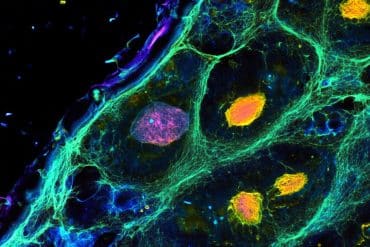Summary: Having a parent who experiences alcohol addiction increases the risk a person will become addicted to highly processed foods, a new study reports.
Source: University of Michigan
People with a parent with a history of alcohol problems are at greater risk for showing signs of addiction to highly processed foods, a new University of Michigan study found.
These foods, such as ice cream, chocolate, pizza and fries, contain unnaturally high amounts of refined carbohydrates and fats that may trigger an addictive response in some people.
U-M researchers wanted to know if a major risk factor for addiction—a parent with alcohol problems—predicted an increased risk of addiction to highly processed foods.
As many as 1 in 5 people seem to show this clinically significant addiction to highly processed foods, marked by a loss of control over intake, intense cravings and an inability to cut down despite negative consequences.
“People who have a family history of addiction may be at greater risk for developing a problematic relationship with highly processed foods, which is really challenging in a food environment where these foods are cheap, accessible and heavily marketed,” said Lindzey Hoover, U-M psychology graduate student and the study’s lead author.

But addictive responses didn’t end with food, as people with food addiction were also more likely to exhibit personal problems with alcohol, cannabis, tobacco and vaping, the research showed.
Diets dominated by highly processed food and excessive intake of addictive substances are leading causes of preventable death in the modern world. This study suggests that interventions are needed to simultaneously reduce addictive eating and substance use.
“Public health approaches that have reduced the harm of other addictive substances, like restricting marketing to kids, may be important to consider to reduce the negative impact of highly processed foods,” Hoover said.
About this addiction research news
Author: Press Office
Source: University of Michigan
Contact: Press Office – University of Michigan
Image: The image is in the public domain
Original Research: Closed access.
“Co-occurrence of food addiction, obesity, problematic substance use, and parental history of problematic alcohol use” by Lindzey V. Hoover et al. Psychology of Addictive Behaviors
Abstract
Co-occurrence of food addiction, obesity, problematic substance use, and parental history of problematic alcohol use
Objective: The present study investigates the rates of co-occurrence among food addiction (FA), problematic substance use (alcohol, cannabis, cigarettes, nicotine vaping), parental history of problematic alcohol use, and obesity as an important step to understanding whether an addictive-like eating phenotype exists.
Method: A community sample of 357 U.S. adults (49.7% male, 77.6% White, Mage 40.7) completed the Yale Food Addiction Scale 2.0 (YFAS2.0), the Alcohol Use Disorders Identification Test, the Cannabis Use Disorders Identification Test, the Fagerstrom Test for Nicotine Dependence, the E-Cigarette Dependence Scale, the Family Tree Questionnaire, and demographic/self-report body mass index questions through Amazon Mechanical Turk. Risk ratios (RRs; unadjusted and adjusted for sociodemographic covariates) were calculated using modified Poisson’s regression.
Results: Risk of FA was higher in participants with problematic alcohol use (RR = 2.13, 99% CI [1.32, 3.45]), smoking (RR = 1.86, 99% CI [0.82, 3.36]), cannabis use (unadjusted; RR = 2.22, 99% CI [1.17, 4.18]), vaping (RR = 2.71, 99% CI [1.75, 4.21]), and parental history of problematic alcohol use (RR = 2.35, 99% CI [1.46, 3.79]). Risk of FA in participants with obesity was only higher in adjusted models (RR = 1.87, 99% CI [1.06, 3.27]). Obesity was not significantly associated with problematic substance use and parental history of problematic alcohol use.
Conclusions: FA, but not obesity, co-occurred with problematic substance use and a parental history of problematic alcohol use. Results support the conceptualization of FA as an addictive disorder. The inclusion of FA as an addictive disorder in diagnostic frameworks is an important area of future consideration.






